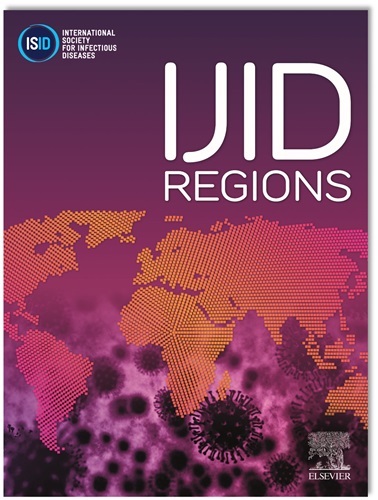Update on multidrug-resistant tuberculosis preventive therapy toward the global tuberculosis elimination
IF 4.3
2区 医学
Q1 INFECTIOUS DISEASES
引用次数: 0
Abstract
Multidrug-resistant tuberculosis (MDR-TB), the deadliest form of tuberculosis (TB), has been included in the 2024 World Health Organization (WHO) priority list of antibiotic-resistant bacterial pathogens owing to its severe public health implications. Almost two billion people worldwide are infected with Mycobacterium tuberculosis; however, the share of MDR-M.tuberculosis remains uncertain. Mathematical modeling estimates that MDR-TB affects nearly three in every 1000 people worldwide, highlighting the urgent need to address TB preventive treatment (TPT) for contacts of MDR-TB cases. Before 2018, close monitoring of contacts of people with MDR-TB was recommended rather than TPT. However, considering the ethical and public health concerns associated with leaving infected individuals untreated, the WHO updated its guidelines in 2018, 2020, and 2022. Despite the limited evidence at the time, the WHO suggested considering quinolone-based TPT for selected high-risk cases. To close this gap in evidence, two large-scale prospective randomized controlled trials were conducted: VQUIN (VQUIN MDR Australia New Zealand Clinical Trials Registry number, ACTRN12616000215426) and TB-CHAMP (TB-CHAMP ISRCTN Registry number, ISRCTN92634082). Both trials evaluated the efficacy of levofloxacin (Lfx) compared with a placebo for MDR-TB after household exposure in adults and children. A combined meta-analysis of the two trials showed a 60% reduction in TB incidence in the Lfx group, and the difference was statistically significant. Based on these results, in 2024, the WHO recommended the use of 6 months of daily Lfx as a TPT for contacts exposed to MDR/rifampicin-resistant TB. This regimen is cost-effective, safe, demonstrates good efficacy, and does not interact with HIV therapies. Despite these promising results, pre-extensively drug-resistance (XDR)-TB (MDR-TB with documented resistance to quinolones) remains an emerging concern. Two ongoing trials will address this challenge: the PHOENIx trial (PHOENIx-MDR TB NCT03568383), which will evaluate the efficacy of delamanid compared with isoniazid for preventing M/XDR-TB after household exposure, and the BRANCH-TB trial (NCT0656848), which will assess the efficacy and safety of 1 month of bedaquiline regimen compared with WHO-recommended TPT regimens. Preventing MDR/rifampicin-resistant TB remains a significant challenge for the global elimination of TB. Although the recent WHO recommendation for 6 months of daily Lf is a promising step, expanding the TPT options for pre-XDR TB and addressing drug intolerance are critical. Ongoing and new trials are essential to develop alternative treatment and achieve TB elimination.
耐多药结核病预防治疗在全球消除结核病方面的最新进展。
耐多药结核病(MDR-TB)是最致命的结核病形式,由于其严重的公共卫生影响,已被列入世卫组织2024年抗生素耐药细菌病原体重点清单。全世界有近20亿人感染结核病,但耐多药结核病感染的负担仍然不确定。数学模型估计,耐多药结核病影响全球每1000人中近3人,这突出表明迫切需要解决对耐多药结核病病例接触者进行结核病预防治疗的问题。在2018年之前,只建议密切监测耐多药结核病患者的接触者,而不是TPT。然而,考虑到对感染者不予治疗的伦理和公共卫生问题,世卫组织最初于2018年、2020年和2022年更新了其指南。尽管当时证据有限,但世卫组织建议考虑对选定的高风险病例采用喹诺酮类TPT。为了缩小证据差距,进行了两项大规模、前瞻性、随机对照试验:VQUIN和TB-CHAMP。两项试验分别在成人和儿童中评估了左氧氟沙星与安慰剂在家庭接触后治疗耐多药结核病的疗效。两项试验的联合荟萃分析显示,左氧氟沙星组结核病发病率降低60%,差异具有统计学意义。根据这些结果,世卫组织于2024年建议对接触耐多药/耐药性结核病的人每天使用6个月的左氧氟沙星(6Lfx)作为TPT。该方案具有成本效益,安全,疗效良好,不与艾滋病毒治疗相互作用。尽管这些数据令人鼓舞,但广泛耐药前结核病(对喹诺酮类药物有抗药性的耐多药结核病)是一个新出现的问题。正在进行的两项试验将应对这一挑战:PHOENIx试验,评估delamanid与异烟肼在家庭接触后预防耐多药/广泛耐药结核病方面的疗效;BRANCH-TB试验,将评估一个月的贝达喹啉方案与世卫组织推荐的TPT方案相比的疗效和安全性。预防耐多药/耐药性结核病仍然是全球消除结核病的一项重大挑战。虽然世卫组织最近对6Lfx的建议是一个有希望的步骤,但扩大广泛耐药前结核病的TPT选择和解决药物不耐受问题至关重要。正在进行的试验和新的试验对于开发替代治疗和实现消除结核病至关重要。
本文章由计算机程序翻译,如有差异,请以英文原文为准。
求助全文
约1分钟内获得全文
求助全文
来源期刊
CiteScore
18.90
自引率
2.40%
发文量
1020
审稿时长
30 days
期刊介绍:
International Journal of Infectious Diseases (IJID)
Publisher: International Society for Infectious Diseases
Publication Frequency: Monthly
Type: Peer-reviewed, Open Access
Scope:
Publishes original clinical and laboratory-based research.
Reports clinical trials, reviews, and some case reports.
Focuses on epidemiology, clinical diagnosis, treatment, and control of infectious diseases.
Emphasizes diseases common in under-resourced countries.

 求助内容:
求助内容: 应助结果提醒方式:
应助结果提醒方式:


